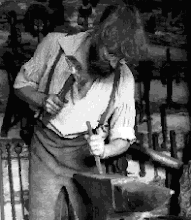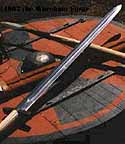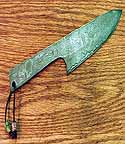Work has been progressing on the African prototype passive draw smelting furnace:

This is the furnace, part way through Jake Keen 'tarting it up'. The core structure here is seen as the gray colour clay. This is straw cobb, about 5 - 4 inches thick laid over a withy framework (see the last post). Next a cushion of straw, roughly 2 inches thick was applied. On top of that is a second clay layer, this dug straight out of the back behind Lee's workshop. Jake plans to extend this covering over the entire structural surface. The extraction slot I laboriously dug into the (mainly rock!) soil has been back filled with loose soil and small gravel (where Jake is kneeling).
Jake is seen here checking one of the clay tuyeres he has been making for rough fit. The plan is to have 16 of these, four for each of the quadrant arches. At this point the exact fit for these has not been established. Likely these will have a pronounced down angle, the tips placed close to the centre of the furnace.
As of last night the construction of the furnace is finished, and an increasingly large wood fire had been built in the interior. Later in the evening, the furnace was packed with stove wood pieces, metal plates put over the arches, and left to burn out over night.
Plan for today is to prepare the furnace for the full smelt series, hopefully to start about noon. The big unknown (for me) is if the interior will be cool enough to permit this work. (The interior chamber is just over 24 inches in diameter.) The lower pit is to be filled with vertically standing green sticks, cut to roughly 15 inches long. These will support the initial combustion, then the developing slag bowl. As more and increasingly fluid slag is produced, it will run down into the gaps between the sticks. Eventually the building mass of slag will slowly burn out the tops of the sticks allowing the block to sag into the pit. If all goes as its supposed to (??) this keeps the developing bloom at the ideal placement inside the furnace.
Wish us luck!




















1 comment:
it looks great! Did you make the reduction of ore?
Post a Comment